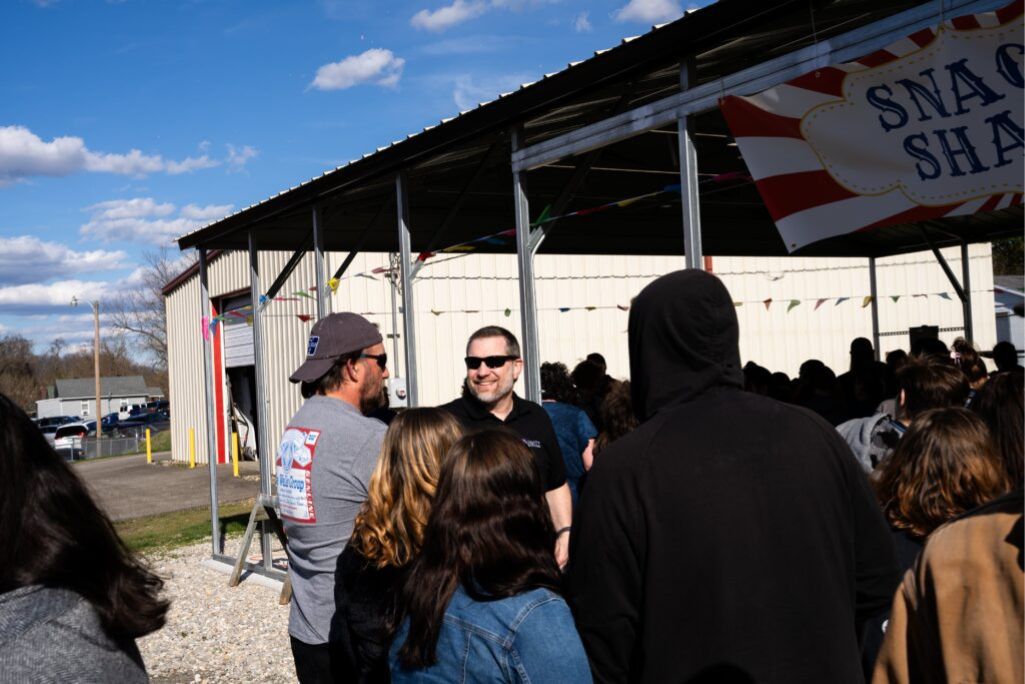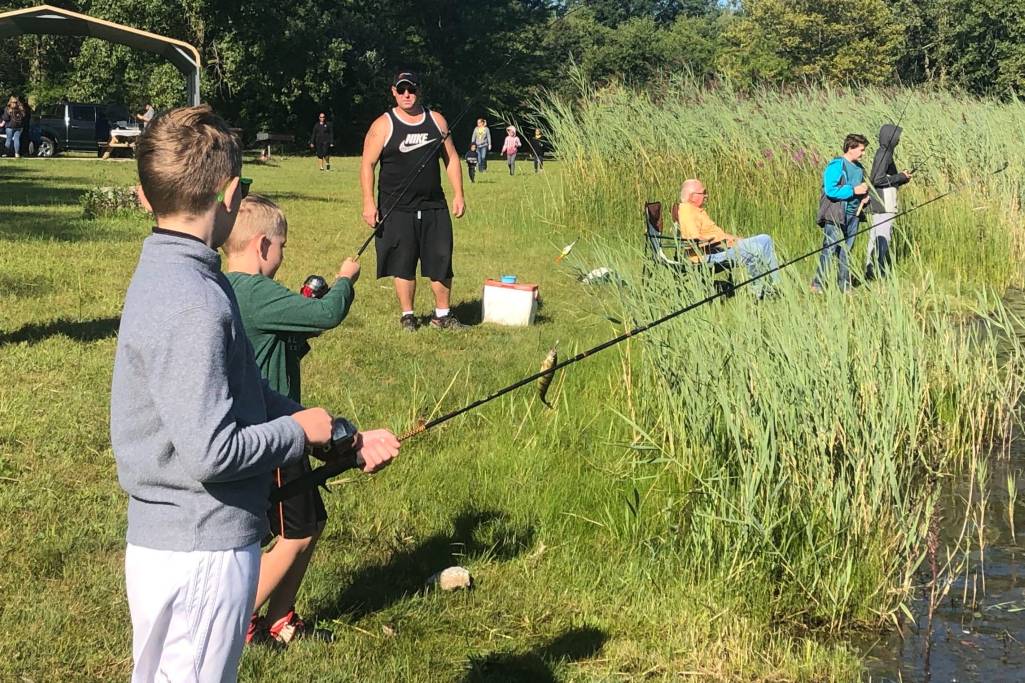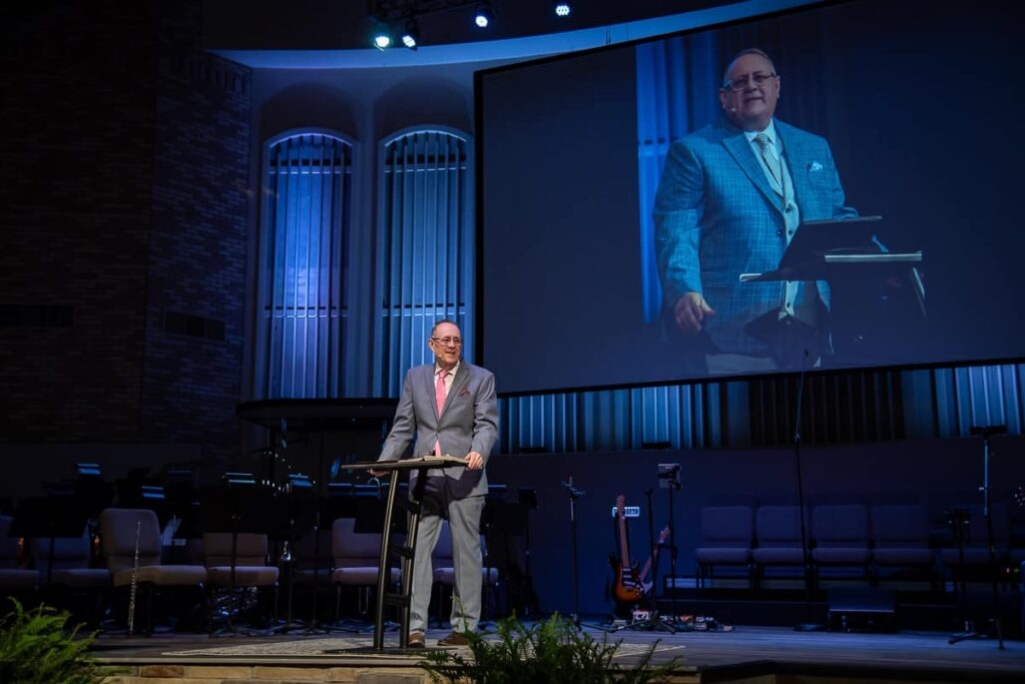
Heath Bauer, center in black shirt, talks to others at Unity Baptist Church's annual spring carnival. The evangelistic event is geared toward families and encourages participants to join Unity on Easter Sunday. Four weeks of evangelism training for church members precedes the event.
ASHLAND, Ky. (BP) — Heath Bauer has experience serving in cultures that are hostile to the gospel and those that welcome it, at least on the surface. There is no question which is tougher for seeing fruit.
In terms of religious freedom, “America is a very comfortable place to live,” said Bauer, pastor of Unity Baptist Church in Ashland, Ky. “But comfort is often the enemy of the mission of God.”
Despite most in the area claiming a connection to God, he estimates as much as 95% of the population is unchurched. “We very much see this as a mission field,” he said.
Bauer and his wife, Amber, served in China and Malaysia through the International Mission Board (IMB) from 2008-2020, when COVID played a large part in their returning to the U.S. He enrolled at Midwestern Baptist Theological Seminary and is currently working toward his Ph.D. in biblical counseling.
His return to the U.S. and accepting the pastorate at Unity coincided with a desire to help churches develop a mindset of community engagement.
“There used to be a predominant build-it-and-they-will-come mentality in churches,” Bauer said. “We’re in a day now where people don’t just naturally go to church. We have to follow the first word of the Great Commission — ‘Go.’ That means we have to get out of our church building and think like Christ.”
That begins identifying what he calls “mission points.”
Efforts focus on low-income areas of the city, such as scrubbing the traditional Vacation Bible School (VBS) and instead hosting it at three different locations. The Christmas program will be held outdoors. “Community groups” within the church identify their areas of ministry, such as a women’s shelter or a nonprofit that helps those who are one step away from homelessness.
“We want to provide some basic needs while getting the gospel to them,” Bauer said. “Many of them have come and been saved and baptized and are now members of the church.”
He has led in places where Christians operate in the shadow of public condemnation, at risk of losing everything. There are spiritual pitfalls to the other side of that coin. When comfort becomes a hindrance, a mental, emotional and spiritual switch needs to be flipped for believers to allow the gospel to bring true change.
“We don’t want to promote the church as a religious exercise of attending a service, going home and not allowing the gospel to transform how we live in our priorities throughout the week,” he said.
“We’re not in a maintenance level of ministry here. We want to engage.”
That calls for a greater desire to reach those at various levels of association and openness to religion. It can be the ones whose connection to church doesn’t go much further than familiarity. It may be Nones, those claiming no religion at all.
Communication with these groups requires nuance. And even though the number of Nones has grown, it has flatlined in recent years and led some researchers to believe there is an openness to the truths in Scripture.
Bauer’s experience has benefitted his ministry in numerous ways. Ashland is just down the Ohio River from Huntington, W.V., home of Marshall University. His knowledge of Mandarin has led to numerous conversations with Chinese students.
The college-aged members and attendees have led in efforts to reach people in difficult-to-reach areas.
“They have a missional heart to get out of the church, and God has blessed in many ways through that,” Bauer said. “They do a service there, and even held a baptism with one of the members who was in a wheelchair and couldn’t get into our baptistry, so they did it there in an inflatable pool.”
Steps like those have his congregation set for good things ahead, he said.
“Unity is a church at peace with one another and is definitely living up to the name. Because of that, I think God is ushering in a period of missional engagement,” Bauer said. “It’s going to be very intentional.”
(EDITOR’S NOTE — Scott Barkley is chief national correspondent for Baptist Press.)


